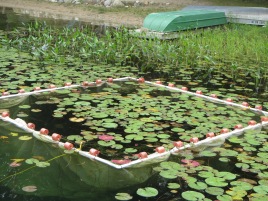Largemouth Bass project coming to a lake near you
Add Summary

Joe Nohner is a CSIS PhD student who's studying largemouth bass, specifically how habitat helps baby largemouth survive and grow, and the socioeconomic factors that influence landowners’ habitat management choices. He's also a passionate fisherman who aims to understand the layers and layers of complexity to solve ecosystem problems. This is an excerpt from Joe's blog, Fishing for Habitat.
June 19, 2014
This summer we will be conducting research on Largemouth Bass in more than 20 lakes in Michigan. Largemouth Bass are an economically and ecologically important game fish commonly targeted by anglers in Michigan. The vegetated habitats that Largemouth Bass utilize in some north temperate lakes are changing as human development intensifies. Study of the relationship between vegetation and age-0 Largemouth Bass growth and survival is needed to better manage this species. This information may be important for fishery and aquatic habitat managers as well as lake associations and property owners as decisions impacting aquatic vegetation are made. Our research will have two components, described below.

A net pen with Largemouth Bass during our research in 2013.
The first is a net-pen study in Chancellor (Blue) Lake, near Fountain, Mich. The purpose of this study is to test whether young Largemouth Bass in net-pens grow better or eat differently when the net pens are placed in habitats with and without aquatic vegetation. Our hypothesis is that young Largemouth Bass in pens with vegetation will be larger, have more diverse diets, and will eat more than fish in pens without vegetation. This research is a follow-up to similar work that we did last year.
The second study is to see whether we can observe similar patterns across twenty lakes in Michigan. We will conduct up to four electrofishing surveys on these lakes in June, July, September and October. We’ll compare the results of our surveys to vegetation maps that we create for each lake, allowing us to compare the amount of aquatic vegetation to the Largemouth Bass populations.
Find out more!
To read a more detailed description of our research this summer, check out this research summary.
I live on this lake, what does it mean for me?
We will conduct an electrofishing survey at night one to two nights in June or July and one to two nights in September or October. Where possible, we will communicate with lakeshore property owners associations ahead of time to let them know our plan. We conduct the surveys at night (video), because the fish are closer to shore at that point. We will also map the vegetation in the lake during the summer. We are happy to share this information after we’ve put it all together, just email me (jnohner@msu.edu)!
We have worked with the Michigan Department of Natural Resources to identify our lakes for this summer and obtain permits. If you live on a private lake, we have likely already contacted the property owner



 Print
Print Email
Email









